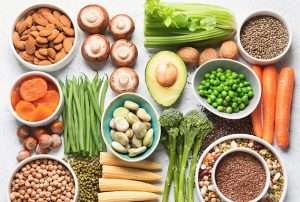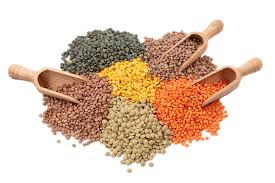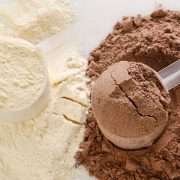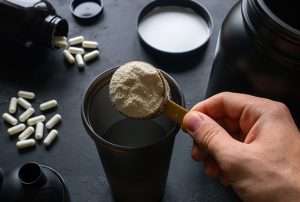Plant Protein- Sources, Benefits & Uses

In a literal sense, a plant protein diet is simply a diet consisting of plants or a diet in which the foundation is made from plants. The Academy of Nutrition and Dietetics defines a Vegetarian diet as being devoid of animal flesh, fish, and seafood.
However, there are closely related terms like lacto-vegetarian, ovo-vegetarian, or Lacto-Ovo vegetarian which basically means diets that include dairy, eggs, or both, respectively. But talking about vegan diets, they are the ones that don’t contain any animal flesh, dairy, fish, seafood or eggs and also exclude honey from the list. Plant Protein is essentially a food source of protein from plants. A plant-based diet consists of plants or is a diet in which the foundation is made from plants. Plant-based
proteins are highly nutritious as they are a great source of proteins and provide other
nutrients such as fibre, vitamins and minerals.
When was it used first?

Vegetarian diets are not just a trend; they’ve long been a staple of human dietary patterns and they continue to be popular even today.
The first Dietary Guidelines for Americans were released in 1980. MyPlate guidelines, which are based on the 2015- 2020 Dietary Guidelines for Americans, include information to create a balanced vegetarian eating pattern to meet nutritional needs. Guidelines state that vegetarians can get enough protein if the variety and amounts of foods consumed are adequate.
Previously, vegetarian guidelines were included in the 2010-2015 Dietary Guidelines. This earlier version was less thorough in how to balance a vegetarian diet and instead instructed on how to substitute the same amount of plant foods for meat options. However, new guidelines include changes in food group composition and portion amounts for vegetarians.
Health benefits of Plant Protein powder
Protein is our body’s building block, especially of bones, muscles and skin. The body needs it to produce hormones, enzymes, and other chemicals. Plant protein are the building blocks for healthy muscles and tissues. Some of the benefits of
plant protein are: helps weight loss, they are high in fiber and essential nutrients and also
have fewer side effects than animal protein.
The health benefits of plant protein powders are plenty. Let’s look at some of them:
1. Healthy Gut

Research published in the journal Nutrients shows that those who eat a plant-based diet have more protective species in their gut that help keeps inflammation levels low. Adding more plants into your diet is beneficial in treating gut microbiome diversity. Keeping microbiome levels in check can help you improve your overall health and well-being. Whereas a lack of it could lead to fatigue, anxiety, depression, skin issues, autoimmune diseases, resulting in poor gut health.
2. Weight Control

Eating foods rich in protein & taking protein supplements helps people feel fuller for longer since plant-based supplements have more fiber in it.
What happens in return is one tends to snack less frequently and consume smaller portion sizes which can help a person maintain a healthy weight or lose weight if necessary. Organic plant protein may thus be efficacious for weight loss.
Eating plant proteins instead of animal protein reduces your caloric intake and boosts nutritional profile. A recent study done in 2018 reported that organic protein intake reduces body weight and total fat mass in people.
3. Fewer Side Effects

Even though Whey Protein is the preferred option for building muscle, it is most likely to cause allergic reactions in people who are knowingly or unknowingly intolerant towards lactose consumption.
It is said that 75% of the population is lactose intolerant and their symptoms range from bloating, indigestion, uneasiness to other similar allergic reaction.
Our 100% plant-based formula derived from a perfect blend of Brown rice and Pea protein is the best solution for this problem. It gives you more fiber, is loaded with antioxidants that fight free radicals, have plant-based digestive enzymes like Bromine and Papain found naturally in Pineapple and Papaya respectively, and is also gluten, soy and lactose-free.
Unlike other protein powders that may have additives added in them to make you feel fuller, Plix is hypoallergenic!
Our product contains no GMO’s and we use natural sweeteners to tingle your tastebuds.
4. Bioavailability

Plant-based proteins are more bioavailable compared to other sources of protein. Bioavailability is the scale rating or percentage to which our bodies can make use of certain protein sources. Our bodies and digestive systems absorb some protein better than others depending on their amino acid profile. All protein sources consist of different sets of amino acid profiles; some are higher compared to others.
This is especially important if you have difficulties with digestion, such as food intolerance, slow metabolism, bloating, or constipation. When protein is more bioavailable body can utilize it better to repair muscle tissue after a hard workout.
5. Fibrous Meal

Plants are highly fibrous. Fiber is a type of carbohydrate that cannot broken down into digestible sugar molecule. It is good for the body. Therefore, fiber passes through the intestinal tract relatively intact.
Fiber consists of both soluble and as well as insoluble fiber. Insoluble fiber like Psyllium Husk helps our digestive system run smoothly. The soluble fiber keeps us feeling full and content after we eat.
There are many Whey protein powders out there that claim to be meal replacement options, but the difference with plant-based protein is that this naturally keeps you full, maintains health and builds lean muscles. If you compare the two, plant protein is more sustainable because it’s natural.
A complete source of protein is food items like Soy and Quinoa which can be taken as complete meals in themselves because they consist of a complete amino acid profile (building blocks of protein).
Most protein-rich items carry different sets of amino acid profiles or parts of this profile. Best way to get complete nutrition is to combine different sources together, which is what we did with our protein supplement. We combined 2 different sets of amino acid profiles found in Brown Rice and Peas that perfectly complement each other and came up with a plant-based nutritional blend that gives you 25 grams of complete protein in every scoop.
6. Pea Protein is a Great Source of Iron.

Currently, Red meat tops the list of rich iron sources in the International diet, but our vegan pea protein is no less. It’s the best way for vegetarians to get their fix. One serving of pea protein powder contains 35 per cent of your Daily Value of iron.
If you compare, the same serving size of animal-based whey protein contains 0 per cent of your iron DV. So not only are you getting a large portion of your daily iron needs out of the way, but you’re also getting plenty of protein.
Conclusion
Organic protein powder offers manifolds of health benefits and can be a preferred source of protein to many people, especially those with certain medical conditions and those who are lactose intolerant.
Sources of Plant-based protein:
Not all plant based sources are a complete source i.e contain all nine essential amino acids.
However plant based products such as soy beans and quinoa are a complete source of
protein. Other plant protein sources include, Lentils, Brown Rice, Green Peas, Kidney
Beans, and Chia seeds.
1. Quinoa

Quinoa is a grain crop that is grown for its edible seed. It is basically a seed which is prepared and eaten similar to a grain.
1 Cup of Cooked Quinoa = 8g Protein
2. Lentil

These are high in fiber and are excellent sources of iron, follate and magnesium.
1 Cup of cooked Lentils = 9g of protein
3. Brown Rice

Brown rice is a vegetarian staple mainly because it’s inexpensive, delicious and packed with fiber. Asians love it and you should try them too.
1 Cup of Brown Rice = 5g of Protein
4. Green Peas

There are plenty of good reasons why you should start adding a handful of peas in your diet. Loaded with vitamin A, B-1, B-6, C, peas are a rich source of phytonutrients, vitamins and minerals which helps in promoting the vision and eye health.
So basically, your everyday Matar Paneer is a good fix for daily protein intake.
Protein Punch
- 7g per 1 cup serving
5. Kidney beans

Kidney beans or Rajma is another protein-rich staple readily available in Indian households. Known to be full of carbohydrates, vitamins, minerals, antioxidants and fiber, it is a wholesome meal that can be enjoyed with rice or chapatis.
Kidney beans can help in weight loss, moderate blood sugar levels and promote colon health.
100g of Kidney beans = 24g of protein
6. Chia seeds

History of Chia seeds is traced back to Aztecs and the Mayan civilization. These tiny black seeds are a powerhouse of important nutrients. Rich in omega-3 fatty acids, antioxidants, fiber, iron and calcium, it is helpful in raising good cholesterol levels.
Start adding chia seeds to your smoothies or sprinkle them on top of your yoghurt. Make the most of it in any form you like.
Protein Punch
- 2 tablespoon for a healthy adult contains 2g of protein
While these Sources are an excellent source of protein, they might not have a complete amino acid profile. A protein source which has all the nine essential amino acids is called a complete amino acid profile.
Plix contains all the nine essential amino acids and much more. We provide you with 25g of protein in each serving which comes in natural flavours like Raw Chocolate, Vanilla Banana, Café Mocha and Mango! (which is our favourite)
Read the full article on plant-based protein sources here
Plant-Based Protein Vs Whey protein


Read the full article on Plant Protein Vs Whey Protein here.

Plix – the plant fix is one of the best combos of different vegan plant proteins, including pea and brown rice protein with superfoods, antioxidants, and electrolytes. It is 100 per cent vegetarian and contains no milk substitutes which is why it is Vegan too. Plix has all the qualities a perfect vegetarian protein should have. Moreover, it is available in small sachets, easy to carry while travelling and within the perfect budget range of every fitness enthusiast. Just need to mix in cold water or milk for perfect health and perfect taste.
Protein Punch 25gm protein per sachet.
Click Here to Buy PLIX Plant Protein
You can also buy our Plant-based protein powder from Amazon here:















